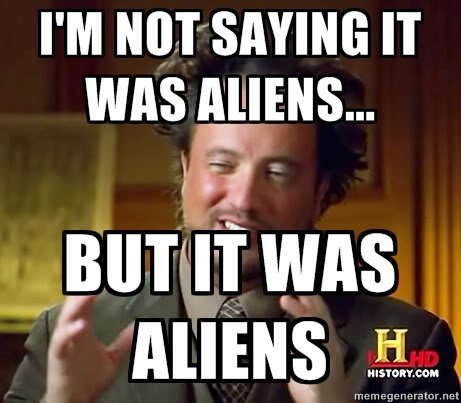So me and Erin were talking about The Vampire Diaries and villain decay the other afternoon when it struck me that Twilight is full of bullshit of the most obscene proportions (as in, more bullshit than the usual bullshit people bring up when discussing Twilight). Think about it--the Cullens pose as high school students forever? No wonder vampires say they've been damned to eternity in hell! I absolutely loved high school and even I wouldn't want to repeat it more than once.
| This is a binturong. It's very cute and I just thought everyone should know this exists. It's screaming "HUG ME, HUMAN FRIENDS!" |
Think about it. Edward tells Bella that they're posing as high school students so that they can blend in with a human town for the maximum amount of time. But is faking your own death every four versus every eight years such a pain in the ass that it's worth going through high school forever? Why not pose as college students? They'd be able to go all over the world, they'd be able to study absolutely anything instead of repeating Algebra Two over and over and over, and no one would care if they were weird. I can only conclude that Edward and Friends don't know how to find a vampire friendly college. This is a shame, as they're quite possibly the only people rich enough to afford higher education at the moment. So I thought I'd jot down some quick tips on choosing the proper college for America's most oppressed minority: vampires.
Find a college that offers night classes
Unless you're a bullshitty Twilight vampire (who I'm starting to suspect only repeats high school to meet underage girls) who isn't affected by sunlight, you're going to want to find a college that offers night classes. While evening classes have traditionally been seen as part of community and commuter colleges, designed to accommodate people who already have careers, many elite institutions are using night classes as a way to provide more flexible scheduling to students who have inflexible commitments (like, for example, the urge to slaughter small mammals and drink their blood).
Cornell offers plenty of night classes. In fact, starting mid-November, all classes that begin past three PM are night classes. I took a night class last year. Every Monday and Wednesday, I'd grab a milkshake from the dining room, climb to the freaking third floor of Morrill Hall, and promptly pass out while the teacher droned on and on about China. (Still aced the class, parents!). For matriculating vampires, finding the proper array of night classes is crucial to promoting a positive learning environment. Nothing detracts from an education like bursting into flames on the way to class. Or bursting into sparkly glitter.
Dining options: Ag schools, night life
Vampires traditionally display a wide variety of eating habits--well, for creatures that only eat blood, that is. Some vampires feed exclusively off humans. Others prefer animals. A few vampires feed exclusively off cats, but they're weird and we don't talk about them much. This is one of the complicating factors in defining 'vampire-friendly' colleges. Texas A&M has a big agricultural program, which is great if you're the kind of vampire who feeds off cows. But it's also in Texas, meaning that a lot of people have guns and Adeline Parks is more than willing to donate her giant silver earrings to melt into bullets.
| Got that, you bloodsucking varmits? |
Pro tip--if you're the kind of vampire that feeds off humans, try going to a northern school. Why? Scarves! Nothing helps hide those suspicious neck marks like a school where everyone's always wearing scarves. Also, liberal northern college students will totally support your alternative lifestyle. Well, right up until the point where you start eating them (although, if you feed off those annoying drunk sorority girls who used to hang around under my window each night last year, you might find some surprising support)
Choosing Your Major: What Works For Eternity?
Lots of vampires are drawn to the easier majors--history, for example, since most of them have experienced it (though your paper on the taste of Queen Victoria's blood probably won't land you an A, even if it does have historical flavor). I'd like to encourage them to branch out a little more. Take something that isn't so open to changes that it's different every decade. You don't want to be one of those vampires who shows up to BIOM 3450 explaining how the liver produces blood and how to balance the four vital humors.
| And you don't want to quote this particular bit of medical wisdom. |
Physics can be useful. The basic laws really haven't changed since Newton stumbled on them. Of course, those basic laws really don't explain how a body can turn into mist or why you have an anathema towards religious symbols, but it's still good to know. Take something out of the box, like English. Hey, the undead don't really need jobs! Architecture is a good course if you like the idea of designing your own imperious lairs. Just don't take chemistry. I'm sitting in it right now and I'm being bored to death.
Evaluate Your Housing Options
Who doesn't like to live in the dorms? Sane people! Also, vampires! While dorm life is great if you want to live on top of people who smell bad and leave their hair in the shower, the normal tolerance levels generally stop at someone hauling in a coffin to replace their bed (though if you do need to sleep all day, you'll find yourself in good company). There's a nice source of food nearby, but you don't want to get lazy and end up with the Freshman Fifteen-People-Whose-Iron-Levels-Are-Suspiciously-Low.
For this reason, it's recommended that vampire students find a place off campus. Cornell has some lovely old fashioned houses built back in the 1800's up on the picturesque Forest Home Drive. Regular students can't even afford a doormat for one of those places, but for some of your older vampires, it'll be like stepping back in time to their childhoods (the cars whizzing up and down picturesque Forest Home Drive will ruin this image, so it's probably best to wear earmuffs to get the full effect. An off campus apartment can also be nice, provided you don't mind the scent of decay coming from the week old bananas in your trash can. Hell, you're a vampire, so you probably love it. In which case--can I start using your trashcans? Because mine stink.









